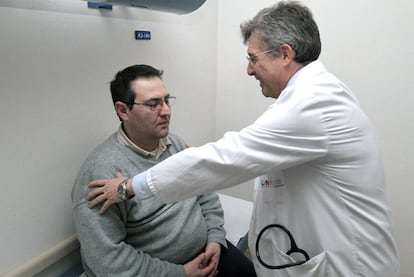Do you need a yearly checkup? Experts warn that they carry risks and do not reduce mortality
General health checks are unlikely to be beneficial, researchers say; even basic blood tests can lead to unnecessary interventions or treatments

“We check our cars regularly, so why shouldn’t we also check our bodies so that we can find and treat abnormalities before they cause too much harm?” This question was posed by a group of Danish researchers in a 2014 editorial published in The BMJ under an enlightening headline: “General Health Checks Don’t Work.” Their answer was clear: “It seems so easy, but the human body is not a car, and, in contrast to a car, it has self-healing properties.”
Not only that: they even warned that this type of examination, which is carried out on healthy people and may include diagnostic tests, “will cause harm in some people.” The researchers went a step further and in 2019 made a systematic review for the renowned Cochrane Library. After analyzing 17 clinical trials involving 230,000 people and comparing adults from the general public who got checked to others who did not, they found that general checkups had “little or no effect” on total mortality or cancer, cardiovascular, heart disease and stroke mortality. Even if it seems counterintuitive, “general health checks are unlikely to be beneficial,” the experts concluded.
“Checkups are necessary when there is already a disease, but performing a screening on healthy people is debatable,” confirmed Borja Rivero, a family doctor at the Doctor Morante health center in Santander, Spain. “People demand it, that’s the problem,” he added. But why is it that undergoing routine medical examinations may not be beneficial? The Danish specialists explained that “most of the commonly used individual screening tests offered in general health checks have been incompletely studied.”
Furthermore, “while we cannot be certain that screening leads to benefit, all medical interventions can lead to harm.” In a report accompanying the research, lead author Lasse T. Krogsbøll, of the Nordic Cochrane Center and Rigshospitalet in Copenhagen, added: “One reason for the apparent lack of effect may be that primary care physicians already identify and intervene when they suspect a patient is at high risk of developing disease when they see them for other reasons,” making additional examinations unnecessary.
However, in order for these people to be identified, they have to go to a health center from time to time, which may not happen in vulnerable groups due to marginalization or other access difficulties. “Those at high risk of developing disease may not attend general health checks when invited or may not follow suggested tests and treatments,” added Krogsbøll. This is known as the inverse care law, a term popularized by the British doctor Julian Tudor Hart, explained Rivero. “The one who demands it receives better care, not the one who needs it the most.”
However, Krogsbøll warned about the importance of distinguishing between people who do not feel sick and those with symptoms or a personal or family history of risk factors. “The conclusions do not imply that physicians should stop clinically motivated testing and preventive activities,” he pointed out.
False positives and overdiagnosis
Even basic tests, such as blood tests, can lead to unnecessary interventions or treatments. First of all, because there are no infallible tests and they can all give a false positive (an altered test that turns out to be nothing, with the additional stress and procedures it can entail) or a false negative (a normal result for someone who does have a problem, creating a false sense of security). “More medicine is not always better,” argued retired specialist in preventive medicine and public health Andreu Segura in an EL PAÍS article from 2008.
“The confusion that occurs among people and among some colleagues has to do with the idea that the more data, the more knowledge, but this is not true,” warned the expert, who is still a member of the Bioethics Committee of Catalonia and the Public Health Advisory Council of Catalonia. “It seems logical, but it is a very poor intuitive logic,” he added, alluding to Bayes’ theorem, which calculates the conditional probability, essential to interpret any diagnostic test: “the veracity of the results doesn’t only depend on the accuracy of the measurement, but on the presence of what you are looking for in the population in which you are looking for it,” he explained. Thus, for statistical reasons, the more patients there are in a population, the more reliable a positive result will be. Conversely, a positive is more likely to be false in the case of rare diseases.
Segura warned of an additional risk. “With indiscriminate screening, when you start looking for things you don’t expect, just in case, the probability of overdiagnosis is very high.” This is what happens when they find latent or highly localized cancers that may never have progressed or may even have remitted spontaneously.
Rivero used as an example a request he receives frequently: to check the cholesterol of young people with no risk factors. “Checking a 32-year-old man with no history of sudden death or hypercholesterolemia in the family is pointless,” and can result in prescriptions for medication of questionable usefulness and that is not without risk in the event of minor changes.
Another example of overdiagnosis could be the frequent vitamin D deficiencies that have been diagnosed since this parameter started being added to other laboratory tests. The truth is that the proper levels are not even clear, and the levels agreed today among experts could be encompassing many healthy people, as U.S. researchers warned in The New England Journal of Medicine.
Scottish general practitioner and educator Margaret McCartney has studied extensively the use of screenings to find signs of disease in people who would otherwise never know about it or suffer any ill effects, and she agrees that more diagnoses may not necessarily translate into better outcomes. As she told The Guardian, “if everyone were scanned for aneurysms [abnormally dilated blood vessels], around 2% of people would be found to have one—but, since most would never cause problems, intervention might well do more harm than good.” McCartney also mentioned a mass screening program for thyroid cancer carried out in South Korea that detected 15 times as many cases without improving mortality from this disease.
In clinical practice, only interventions that work should be used, the Danish specialists point out in their editorial. They suggest focusing the efforts on structural interventions aimed at reducing disease, such as imposing higher taxes on tobacco and alcohol or restricting corporate advertising of harmful products. And instead of having a general checkup every year, added Rivero, “the key is to maintain the right weight, walk or do moderate physical exercise and not smoke.”
Sign up for our weekly newsletter to get more English-language news coverage from EL PAÍS USA Edition
Tu suscripción se está usando en otro dispositivo
¿Quieres añadir otro usuario a tu suscripción?
Si continúas leyendo en este dispositivo, no se podrá leer en el otro.
FlechaTu suscripción se está usando en otro dispositivo y solo puedes acceder a EL PAÍS desde un dispositivo a la vez.
Si quieres compartir tu cuenta, cambia tu suscripción a la modalidad Premium, así podrás añadir otro usuario. Cada uno accederá con su propia cuenta de email, lo que os permitirá personalizar vuestra experiencia en EL PAÍS.
¿Tienes una suscripción de empresa? Accede aquí para contratar más cuentas.
En el caso de no saber quién está usando tu cuenta, te recomendamos cambiar tu contraseña aquí.
Si decides continuar compartiendo tu cuenta, este mensaje se mostrará en tu dispositivo y en el de la otra persona que está usando tu cuenta de forma indefinida, afectando a tu experiencia de lectura. Puedes consultar aquí los términos y condiciones de la suscripción digital.









































